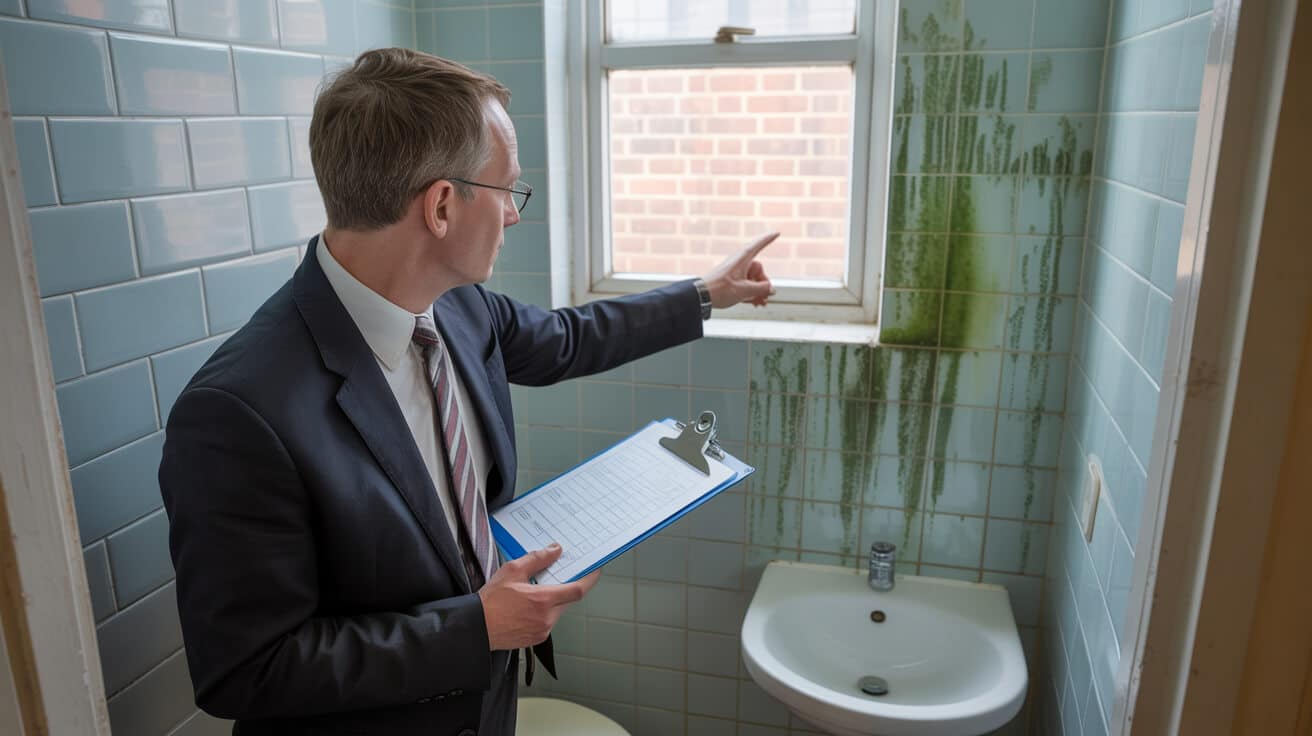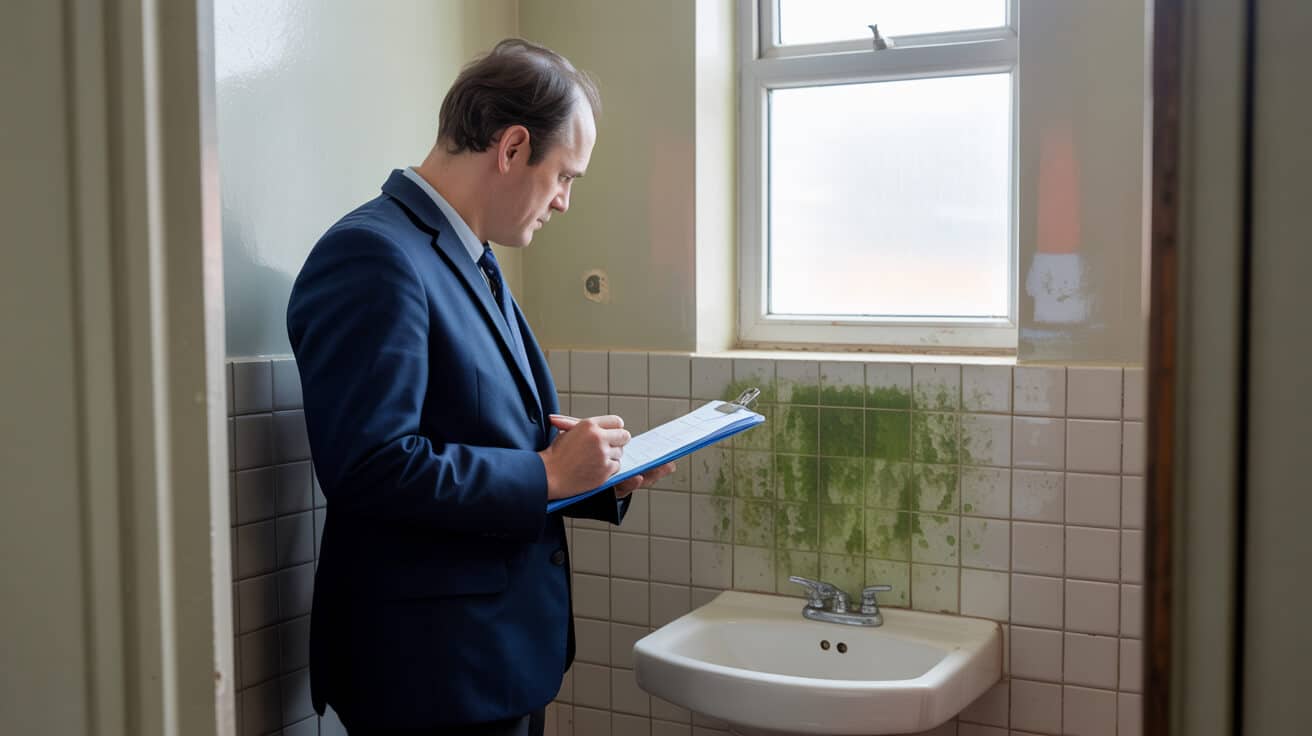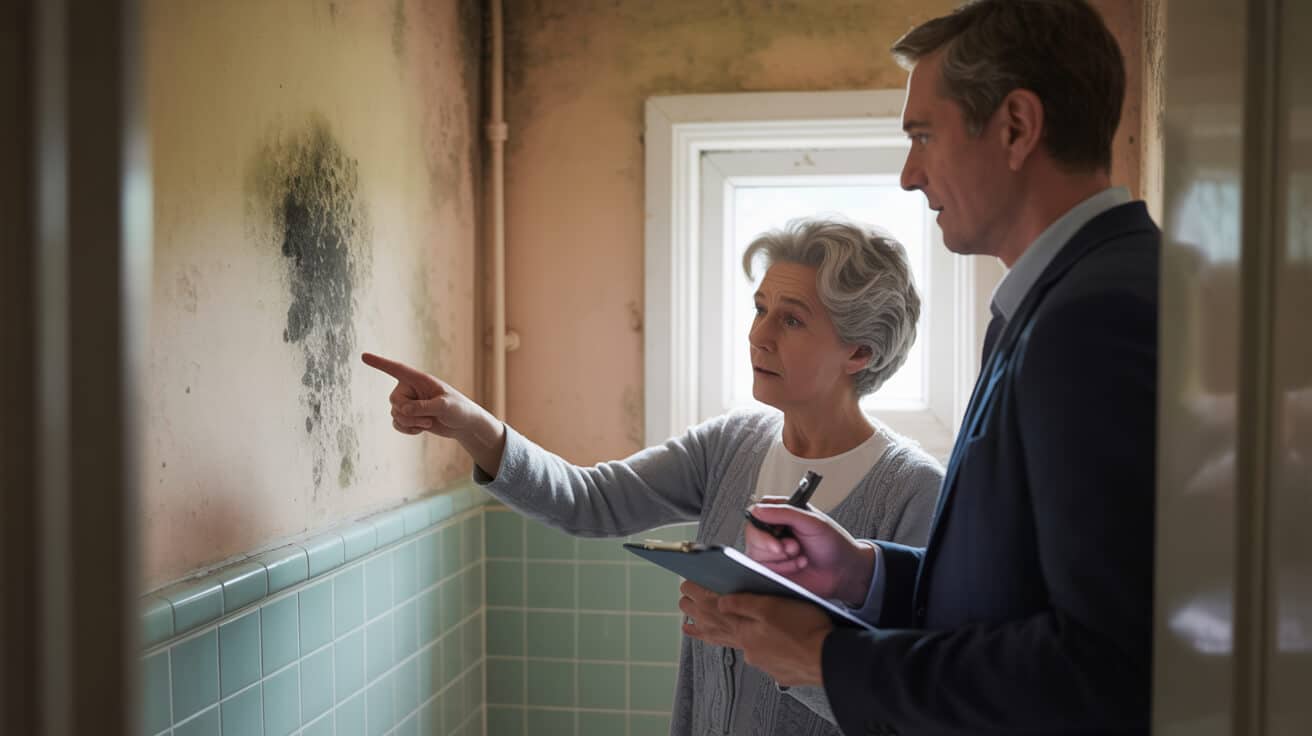 A Tenant’S Maintenance Education Guide Helping Residents Care For Your Property
A Tenant’S Maintenance Education Guide Helping Residents Care For Your Property

How Can Tenants Spot Hidden Home Risks Before They Become Expensive?
Most tenants aren’t blindsided by major repairs—they miss the “quiet clues” that turn small problems into big costs. If you’ve ever lost sleep wondering if a tiny patch of mould or a funny smell will cost you your deposit, you’re not paranoid. You’re just overdue for a sharper approach.
The money you don’t lose is in the details you catch early.
Hidden home risks nearly always start as minor warnings: a powdery stain on the ceiling, odd smells near a damp patch, or a plug socket that suddenly buzzes. Over 50% of tenants who face damp, leaks, or blocked airflow admit they ignored an early sign—until the bill (and stress) doubled (English Housing Survey 2022-23). Your goal: let nothing slide.
The most common “shy” signs are:
- Condensation: that comes back daily, especially on windowsills
- Musty odours: in corners, wardrobes, or under sinks
- Bubbling, peeling, or cracked paint: —especially at skirting, window frames, or behind furniture
- Water marks: appearing above windows or on ceilings, no clear cause
- Drains running slower: or toilets making new gurgling noises
- Smoke or CO alarms: going off for no visible reason
- Doors or windows that stick: (often a hidden swelling, possible water ingress)
Ignore them, and you risk everything from health impacts to lost deposits or even tenancy disputes.
Think of your home like a car: you don’t wait until it breaks to act—you listen for rattles and get checked before costly failure.
Action plan:
1. Inspect monthly: five minutes with a torch—inside cupboards, windowsills, behind furniture.
2. Document: phone photos + a one-line text or email. “Spotted a damp patch in living room, see attached.”
3. Report quickly: even if you’re not sure it’s urgent. Landlords, agents, and professionals appreciate proactive tenants.
4. Log responses: keep a “repairs folder” in email or notes; it’s your best friend if anything escalates.
Spot it, report it. That’s the single best way to keep minor issues from stealing your peace of mind—or your deposit.
Do Landlords or Tenants Handle Repairs? (Clearing Up Common Confusion)

If you’ve ever argued (or heard horror stories) about “whose job is it?”, you’re not alone. The single most common dispute in UK rentals is about who pays—and who is responsible for repairs.
Structural, electrical, and core safety: always the landlord. Everything else: check your agreement and stick to routine care.
Landlords must fix:
- Heating and hot water problems (boilers, radiators, pipe leaks)
- Faulty wiring or electrics (other than bulb changes)
- Leaks from external faults or broken roof tiles
- Blocked drains or sewers not caused by your normal use
- Anything fire, gas, or carbon monoxide-related ([gov.uk](https://www.gov.uk/government/publications/landlord-and-tenant-rights-and-responsibilities-in-the-private-rented-sector/landlord-and-tenant-rights-and-responsibilities-in-the-private-rented-sector?utm_source=openai))
Tenants are responsible for:
- Keeping the property clean and tidy
- Routine waste removal and minor cleaning in shared areas
- Replacing lightbulbs, alarm batteries (unless hard-wired)
- Unblocking plugholes and toilets that block due to everyday use (e.g., hair, food scraps)
- Flagging all faults promptly, in writing
The law calls this tenant-like manner—it’s about respect and care, not technical skills ([Shelter Legal England](https://england.shelter.org.uk/professional_resources/legal/housing_conditions/responsibility_for_repairs/disrepair_and_safety_responsibilities?utm_source=openai)).
Top tip:
If in doubt, message your landlord or agent before doing anything—“I noticed X, does this fall under my day-to-day care, or should I leave it for a professional?” Written records protect you against unfair blame, accidental rule-breaking, or deposit deductions. DIY on anything safety-critical is risky, can violate your contract, and could even void your deposit (Shelter Cymru).
Acting with clarity keeps you respected and shuts down most disputes before they brew.
What Should a Tenant’s Regular Upkeep Routine Include?

Big repair bills are rarely caused by “bad luck”—they’re the price for skipped routines. The reality? Small, repeatable habits save you seven times out of ten when it comes to deposit disputes or agent complaints.
Most deposit arguments start with a missed chore, not a major disaster.
Build this into your week:
- Test smoke and CO alarms every month. Press, listen for beep, swap batteries or alert the landlord if dead.
- Wipe down window sills and mirrors—moisture pools are where mould always starts.
- Empty bins, wipe food debris, and clean shared spaces—even if you’re not the only one using them.
- Clear exits and corridors; never block your main escape routes with boxes, bikes, or shoes.
- After baths or showers, open a window or run an extractor for 10–20 minutes.
If you have garden or outdoor duties:
- Mow grass, trim overhanging shrubs, or sweep patios (stick to what’s listed in your contract)
- Photograph any damaged fence or shed for your landlord—*date-stamped pictures can bail you out of unjust blame.*
If your tenancy agreement is fuzzy, or you’re picking up after others, flag it early. Good documentation and honest communication mean fewer headaches and lost money later.
Five minutes weekly can buy you hundreds of pounds in returned deposits—and keep you off the agent’s problem tenant list.
How Can You Beat Damp, Condensation, and Mould Before They Take Over?

A little condensation isn’t a disaster—a little mould can ruin your health, your comfort, and your end-of-tenancy finances in one minimalist black patch. Here’s how smart tenants shield themselves:
Mould hates fresh air and fast response. Ignore it, and you trade fresh paint for deposit deductions and coughs.
Core steps:
- Open windows at least 5 minutes daily—even on cool days.
- Use extractor fans when cooking or showering; keep them running until surfaces are dry.
- Dry windows, tiles, or mirrors after heavy use (cooking, shower, laundry).
- Pull large furniture 2–3cm away from shared or exterior walls (major cause of “hidden” black damp).
- Never dry clothes directly on radiators or electric heaters; use an aired rack near a vent.
What’s your job versus the landlord’s?
- Daily drying, venting, and wiping: *your* job.
- Large leaks, persistent or structural damp, black patches spreading across paint or ceiling: *the landlord’s*—report with photos and a date ([Citizens Advice](https://www.citizensadvice.org.uk/housing/repairs-and-housing/repairs-and-housing-conditions/your-rights-when-you-ask-for-repairs/?utm_source=openai)).
Watch for:
- Recurring condensation, especially in cold weather
- Bubbling, cracked, or peeling paint
- Persistent musty odours, even after cleaning
Quick reports and a photo log protect both your health and your wallet, sometimes even your legal rights.
If you see “ghost marks” behind wardrobes or renewing spots after you thought you fixed it, escalate. That’s a structural or external issue; you’re judged on reporting swiftly, not fixing it solo.
What’s the Smartest Way to Report Repairs and Get a Fast Response?

Slow reports mean slow repairs—every day of delay risks bigger bills, messier evidence, or a longer fix wait. Most agents and landlords prefer speed and clarity to guesswork and drama.
A phone photo attached to a clear email beats a dozen calls—your paper-trail is insurance and motivation.
For effective reporting:
- Use email (or the landlord’s portal); attach a photo for quick understanding.
- Subject lines: clear and honest—“Radiator leak—urgent, kitchen, flat 1.”
- State when the problem started and if it’s getting worse.
- Keep a folder of all messages and landlord replies.
Repair request email template:
Subject: Leak—Kitchen radiator, urgent
Dear [Agent/Landlord],
Noticed a leak from the kitchen radiator on [date]. Water is visible on the floor. Attached is a photo. Please confirm when this will be addressed.
Thanks,
[Your Name]
After 3 working days without a reply: send a polite reminder. If safety, heat, or power is off—call first, then follow up in writing for the “paper trail.”
Written records fix more problems than heated calls—and protect both your home and your deposit if a dispute ever lands.
Making your case easy to act on earns respect and action—nobody likes guesswork, and evidence always wins.
What Steps Can You Take When Repairs Are Ignored or Drag On?

Not every agent or landlord is prompt—sometimes issues slip, sometimes they stall. Your role? Keep calm, keep records, and know when to escalate tough cases.
Tenants who keep logs and chase on schedule are the ones who win disputes and keep homes safe.
If repairs drag or get ignored:
- Log *all* emails, texts, photos, and notes of phone calls or visits (with times, dates, and who you spoke with).
- Escalate serious health or safety risks to your local council’s housing or environmental health department—especially for persistent damp, unchecked leaks, or homes without heat in winter ([gov.uk/private-renting/repairs](https://www.gov.uk/private-renting/repairs)).
- Use templates (Citizen’s Advice, Shelter) for formal letters or to get step-by-step legal advice ([Shelter England](https://england.shelter.org.uk/housing_advice/repairs/damp_and_mould_in_rented_homes?utm_source=openai)).
Your right to a safe, decent home is protected—councils can order repairs and protect you against eviction for reporting faults.
Best practice:
Keep a simple “repairs logbook”—a notebook, spreadsheet, or note app. Jot the date, issue, who you contacted, and include photos at every stage. This turns every minor dispute into a “solved with proof” outcome.
Free support is available—no tenant needs to feel bullied or out of their depth just for raising safety.
Never leave urgent safety issues unreported because of nerves—your health and home carry more weight than awkward conversations or misplaced politeness.
Which Simple Habits Save Your Deposit—and Boost Your Comfort?

Tenancy comfort is built on three pillars: routine, action, and evidence. Small wins—like wiping surfaces or chasing a mystery drip—add up to big peace of mind (and less drama at checkout).
Your deposit stays safer than your stuff—if you build evidence as you go.
Daily and weekly “deposit protectors”:
- Air rooms after cooking, showering, or drying clothes inside.
- Wipe condensation wherever you find it—windows, tiles, mirrors.
- Store heavy furniture away from cold walls.
- Resolve slow drains, wobbly doors, or loose handles as soon as they crop up—report if unsure.
- Photo log before and after any changes—most disputes are won by the date-stamped photo.
Record keeping tools:
- Buy or download a “tenant logbook” app.
- Take move-in and move-out photos; file evidence as changes appear.
- Use ready-made report templates for email or landlord portals (downloadable from most maintenance websites).
Five minutes every weekend is the difference between a smooth deposit return and a budget-busting surprise.
Hustle on your own behalf—put comfort first, let minor issues become no one’s emergency, and keep your downtime drama-free.
Where to Turn for Expert Help or a Step-by-Step Support?

Handling home care shouldn’t turn into a guessing game or stress test. All Services 4U is designed for tenants who want results, not run-arounds.
Our clients say the best support is real people, talking in real words, with your safety first.
What you get with All Services 4U:
- Straight-talking advice—call, WhatsApp, or email for clear, no-pressure guidance
- Fast repairs, scheduled for your needs—emergencies, routine maintenance, and one-off checks
- Proactive “wellness checks” identifying what you can spot, what your landlord must handle, and what to do next
- Free online resources: checklists, video walk-arounds, and report templates you can copy in two taps
“I spotted an early leak on a video call and avoided both hassle and a wall ruined by mould.” “My boiler was fixed first time because I used your template, not after a dozen emails.”
— Client stories like these show what a difference real support makes (Trustpilot).
Tips for getting the best help:
- Snap and send photos, don’t guess—if you can’t see the problem, book a video consult before anything escalates.
- Use checklists for a quick “have I missed anything?” spot-check before reporting issues or leaving for holidays.
- Take part in free live Q&A sessions—take two minutes to ask, or just listen and plan ahead.
A tenancy lived with confidence, record-keeping, and a dose of support is the new standard of “tenant-like manner.”
Secure Peace of Mind with All Services 4U Today
Your home should be a haven, not a source of hassle and uncertainty. All Services 4U brings together practical knowledge, certified trade skills, and honest support—so you stay ahead of repairs, protect your deposit, and live stress-free.
Our team is:
- UK-certified (IPAF, PASMA, City & Guilds technicians)
- Quick to respond—emergency, routine, or oddball repairs
- Proud of our simple, trustworthy advice (no jargon, no sales tactics)
- Consistently rated five stars across the UK
Take these steps for ultimate peace of mind:
- Act fast on warning signs—don’t wait for problems to grow
- Build your “tenant logbook” with photos and notes, starting today
- Use our guides and templates to report issues with zero friction
- Reach out for a repair, walkthrough, or just a reality check, whenever you need it
Tenancy is easier when you don’t go it alone. Save your deposit, fix problems early, and know backup is always one call away.
Contact All Services 4U—protect your home, your wallet, and your health. Real solutions, real advice, every step of the way.
Frequently Asked Questions
How do property repair roles divide between landlords and tenants—and what boundaries must never be crossed?
Landlords must, by law, take full responsibility for repairs involving structure, utilities, and any aspect that affects housing safety, while tenants are charged with routine upkeep and immediate reporting. Even if a lease agreement looks ambiguous, statutory landlord duties can’t be shifted to tenants; repairs like roof leaks, broken boilers, faulty wiring, or persistent damp are always up to the landlord. Tenants, meanwhile, handle the daily pulse of the property—keeping spaces hygienic, changing lightbulbs or batteries, and promptly reporting if anything seems off.
A single, well-timed message—backed with a photo—can protect both your deposit and your peace of mind in the event of a dispute.
Legal data published by the Tenancy Deposit Scheme in 2023 revealed that nearly a third of UK deposit losses were caused by confusion or delay around repair duties. Smart tenants document with photos and concise texts, never attempting major repairs themselves and instead involving qualified professionals for anything connected to electrics, gas, or water supply. If a request from a landlord seems to step beyond tenant basics, referencing All Services 4U or Citizens Advice guidelines clarifies safe boundaries—so you’re never on the hook for legal compliance lapses.
What safeguards help clarify housing responsibilities?
- Reference your agreement but remember: UK law overrides contract loopholes on statutory repairs.
- Always document problems in writing and visually.
- Call in certified trades for anything with regulatory or safety implications; DIY is rarely compliant or safe.
- Trusted property maintenance services like All Services 4U exist to bridge the communication gap and secure both comfort and compliance.
What routines and habits have the biggest impact on deposit protection and hassle-free tenancy?
Establishing small, regular maintenance routines is the backbone of deposit safety and stress-free living. Fire alarms, ventilation, and moisture control are easy to overlook, but unattended details often snowball into property loss or deposit drama. Tenants consistently following weekly and monthly checklists see fewer disputes and faster repairs—sometimes eliminating friction altogether at move-out, especially in multi-tenant properties.
Regular logs, even if just with your mobile’s photo roll or a quick table of dates, are a secret weapon. The Deposit Protection Service (2024) reported that tenants tracking tasks and sending monthly care summaries cut their end-of-tenancy deposit deductions by over 40%.
Which personal systems keep your property—and pocket—secure?
- Monthly checklist:
- Inspect alarm batteries, log changes.
- Photograph appliance condition and exterior spaces.
- Mop up condensation and wipe moist corners to banish mould.
- Weekly habits:
- Clear window ledges and bathroom tiles after showers.
- Ensure exits and hallways are always unobstructed.
- Bin regular emptying—pests and fines love neglect.
Creating a “tenant care log” helps you track and prove good stewardship. Even for shared houses, a basic rota—coupled with group photos on WhatsApp—resolves nearly all “who missed what” disputes. When it comes to snagging or agent inspections, well-kept records put the odds decisively in your corner.
Which hidden signals reveal leaks, damp, or mould before they become expensive or risky?
Leaks and damp rarely announce themselves with dramatic puddles—instead, the first clues are subtle: a musty edge to the air, faint paint bubbling, or elusive condensation under a sofa. Industry analysis (Propertymark, 2023) found that over 80% of extensive water or mould damage originated as a barely visible patch or a persistent hint of odour. Tenants trained to spot these micro-signals preserve both health and property value, and sidestep difficult disputes later.
The earliest warning isn’t a leak but a nagging odd smell or strange shadow behind furniture. Noticing, logging, and reporting it means you’re never caught off guard.
How do you develop an expert’s eye for hidden moisture?
- Windows & ledges: Damp curtains, condensation that doesn’t fade by midday.
- Walls & floors: Discoloured paint, swelling skirting boards, darkening behind wardrobes.
- Ceilings & corners: Flecks, rings, or subtle cracking near rooflines.
- The air: An earthy, persistent smell—especially after ventilation—isn’t just “old house syndrome.”
- Soft furnishings: Unexpected dots, streaks, or tacky textures.
As soon as these signs appear, open windows wide, move furniture away from suspect areas, and alert your landlord. Document with photos and keep a timeline—proving you acted promptly is critical if a disagreement arises.
What’s the optimal reporting process for repairs—and how do you keep the timeline moving if your landlord delays?
Timely, written repair requests are your safety belt—creating a transparent, timestamped record that accelerates fixes and proves your vigilance should disputes arise. Data from tenant advocacy groups reveal that tenants who submit photo-backed repair requests via email or WhatsApp see action 50% faster than those relying on phone calls or verbal mentions. For urgent risks—heating loss, electrical faults, security breaches—clarity and proof win every time.
If a landlord doesn’t respond within three working days to a major concern (or 24 hours for hazards), proactive follow-up is essential. Quoting your last message and reiterating the specifics moves your case up the queue while showing you’re not passive.
What steps make your repair request unignorable?
- Focus: State exactly what’s wrong, with date and location. E.g., “Kitchen ceiling leak, started 5 Feb, room below bathroom.”
- Attach: Photos or short videos, labelled or annotated for clarity.
- Emphasise urgency—health, safety, or property damage demands the word “urgent.”
- Request a timeline, and log all replies.
- Escalate if unaddressed: After three to seven days (depending on risk level), reference previous communications and the tenancy agreement.
- Trusted partners such as All Services 4U are equipped to generate formal reports or even intervene if landlord silence persists.
A consistent paper trail isn’t just for disputes—it often convinces agents and landlords to act faster.
When is escalation beyond your landlord justified—and what documentation makes your case dispute-proof?
A landlord ignoring genuine repair needs or pushing hazardous responsibilities onto you is breaching both law and trust. UK legislation shields tenants from repercussions for valid complaints while requiring landlords to act promptly on issues that impact safety or habitability. The key is calm, professional escalation, anchored in records and legislative references—not threats or CC’ing every authority.
The UK Housing Dispute Survey (2024) marked a 75% success rate for tenants providing a clear timeline of written messages, dated photos, and relevant tenancy references. Law and reputation both reward composure and documentation.
How do you escalate without burning bridges—or risking your deposit?
- Escalate after 72 hours for severe hazards, or one week for non-urgent repairs.
- Present emails, photos, and agreement clauses; structure your escalation chronologically.
- Contact your local council’s environmental health or housing teams for ongoing dangers.
- Use templates from Shelter, Citizens Advice, or All Services 4U to standardise your escalation and add legal weight.
- Stay fact-focused. Emotional language or accusations rarely help—professional presentation wins every case.
Awareness of your escalation rights puts you in control—not just of your deposit, but of your ongoing well-being and household stability.
What are the advantages of partnering with a professional property maintenance team rather than tackling problems solo?
Tenants who rely on verified professionals not only safeguard property and health but also dramatically reduce stress and administrative load. All Services 4U and similar services offer not just repairs, but certification, compliance assurance, photo-documented logs, and mediation support in case of disputes.
Bringing in experts means fewer delays, better compliance, and total confidence at inspection time—there’s no more guessing whether you’ve done enough.
Industry findings show professional intervention resolves urgent property issues 70% faster than ad hoc attempts, while also bolstering the reliability of your documentation for landlord discussions or deposit queries (Trustpilot, 2024).
What unique strengths do expert maintenance firms such as All Services 4U offer?
- Rapid access to multi-skilled, certified technicians—no more last-minute contractor hunting.
- Live diagnostics and advice offset panic, allow accurate triage, and reduce uncertainty.
- Legal compliance—every job is coded, certified, and referenced, meeting UK statutes and boosting deposit protection.
- Professional reporting and photo-logging that create a watertight case for any dispute or insurance claim.
- Ongoing guidance for preventative care—keeping future repairs to a minimum and standards consistently high.
To maximise value, contact at the first sign of trouble, save each expert report or service photo in your tenant log, and request preventative maintenance guidance, not only reactive help. Knowledgeable, responsive property care isn’t just peace of mind—it’s a direct route to a clean bill of health at every tenancy milestone.



